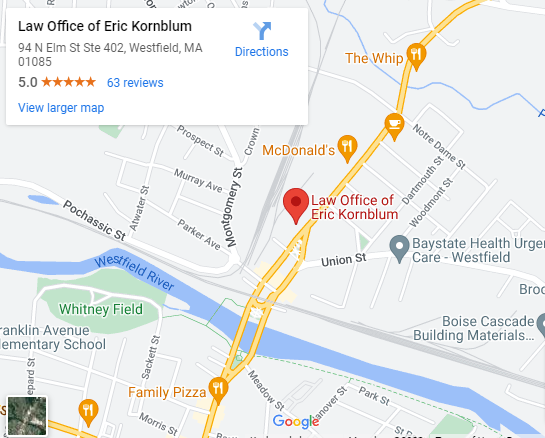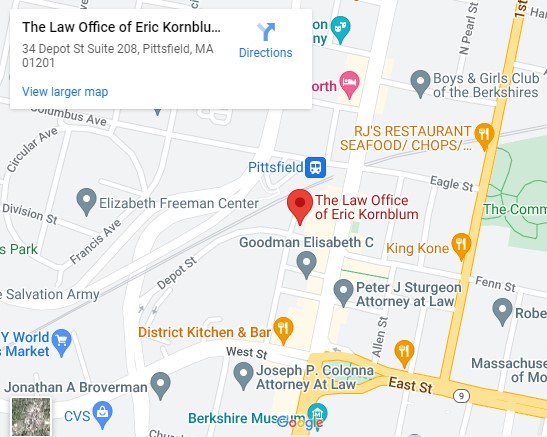Navigate Bankruptcy in Massachusetts with an Experienced Attorney
Dealing with debt and financial problems can be a lot to handle, and seeking bankruptcy information becomes crucial. Bankruptcy is a legal process meant to assist individuals like you in recovering financial stability during times of overwhelming debt. Understanding the main elements is essential, and that is where the guidance provided by lawyers of the Law Office of Eric Kornblum, located in Springfield, MA, becomes invaluable.
Brief Summary
To make this article easier to understand for you, we have provided a summary of each section:
- Bankruptcy is a legal process for individuals and businesses facing overwhelming debt, offering a structured way to manage or eliminate debt and achieve a fresh financial start.
- Different types of bankruptcy, such as Chapter 7, Chapter 13, and Chapter 11, provide tailored approaches, like liquidating assets or creating a repayment plan, to address specific financial situations.
- Choosing the appropriate type of bankruptcy depends on individual circumstances and requires a clear understanding of each option’s implications.
- Filing for bankruptcy involves several steps, including assessment and counseling, choosing the correct chapter, completing necessary forms, filing the bankruptcy petition, and attending hearings.
- The assistance of a bankruptcy lawyer is crucial in navigating the complexities of the legal process, safeguarding interests, and maximizing the benefits of bankruptcy for a more secure financial future.
At the Law Office of Eric Kornblum, we will provide the bankruptcy information you need in Springfield, MA. We also recognize the complexities of bankruptcy and strive to provide you with the guidance necessary to make comfortable and informed decisions.
What is Bankruptcy?
Bankruptcy is a legal process designed to help individuals and businesses overwhelmed by debt. It provides a structured way to manage or eliminate debt, giving you a fresh financial start. Different types of bankruptcy, like Chapter 7 or Chapter 13, offer varying approaches, such as liquidating assets or creating a repayment plan.
The goal is to provide relief against financial difficulties while ensuring a fair distribution of assets among creditors. It is a tool for financial recovery, not a sign of failure. In this article, we will provide you with a general explanation of all the bankruptcy information you need in Springfield, MA, before coming to a decision.
What are the Different Types of Bankruptcy?
There are several types of bankruptcy, each serving different purposes. The most common ones for individuals and businesses are:
- Chapter 7 Bankruptcy: Also known as liquidation bankruptcy, it involves selling non-exempt assets to pay off debts. This bankruptcy type provides a fresh start by eliminating most unsecured debts.
- Chapter 13 Bankruptcy: This involves creating a manageable repayment plan over three to five years. This bankruptcy type allows individuals to keep their assets while gradually paying off debts.
- Chapter 11 Bankruptcy: Primarily designed for businesses, this bankruptcy type allows for restructuring and continued operation while repaying creditors.
These chapters offer tailored approaches to address specific financial situations, providing options for debt relief and financial recovery. Choosing the right chapter depends on your circumstances and requires a clear understanding of each option’s implications.
What Type of Bankruptcy Should I File?
The type of bankruptcy you should file depends on your unique financial situation.
- Chapter 7: If you have significant unsecured debts (like credit cards or medical bills) with little to no ability to repay, Chapter 7 is your best bet. This bankruptcy chapter is for those willing to liquidate non-exempt assets to settle debts.
- Chapter 13: This bankruptcy is for individuals with a regular income who want to keep valuable assets like a home or car. Chapter 13 is an excellent choice if you can commit to a manageable repayment plan over three to five years.
- Chapter 11: If you are a business owner and need to restructure debts while continuing operations, Chapter 11 is the best choice. Chapter 11 is also an option if neither Chapter 7 or Chapter 13 suits your business.
Choosing the right type is crucial, and consulting with our experienced bankruptcy attorney can help you navigate the complexities and make an informed decision based on your specific financial circumstances.
How Do I File for Bankruptcy?
Filing for bankruptcy involves several steps, and it is advisable to seek the guidance of our bankruptcy lawyer for the most accurate and personalized advice. We offer a general overview of the filing process below:
- Assessment and Counseling: Credit counseling from an approved agency must be considered within six months before filing for bankruptcy.
- Choosing the Right Chapter: An individual should be able to determine whether Chapter 7, Chapter 13, or Chapter 11 is appropriate for their situation.
- Completing the Petition and Schedules: Gathering financial information, including assets, income, expenses, and debts, is critical. The necessary bankruptcy forms, including the petition and schedules, should be filled out correctly.
- Filing the Bankruptcy Petition: All the relevant forms should be filed to the bankruptcy court in one’s jurisdiction. The required filing fee must also be paid unless there is eligibility for a fee waiver or installment plan.
- Automatic Stay: Upon filing, an automatic stay goes into effect, halting most creditor actions, such as collection efforts or foreclosure.
- Creditors Meeting (341 Meeting): The individual filing bankruptcy must attend a meeting with their bankruptcy trustee and creditors to discuss their financial situation.
- Chapter 13 Repayment Plan (if applicable): A repayment plan must be proposed to the court if filing for Chapter 13.
- Financial Management Course: Completing a debtor education course before receiving a discharge must be done by the filer.
- Receive Discharge: Once all requirements are met, the court issues a discharge, releasing the individual from personal liability for certain debts.
Why Should I Get the Help of a Bankruptcy Lawyer?
Getting the help of our bankruptcy lawyer is highly beneficial for several reasons:
- Knowledge of Bankruptcy Laws: Bankruptcy laws are intricate and challenging to navigate. Our experienced attorney understands the complexities and ensures your case complies with all legal requirements.
- Individualized Guidance: Our lawyer can assess your unique financial situation and recommend the most suitable bankruptcy chapter for your needs, whether it is Chapter 7, Chapter 13, or Chapter 11.
- Proper Document Preparation: Filing for bankruptcy involves extensive paperwork. Our lawyer helps you complete the necessary forms accurately, minimizing the risk of errors that could delay or jeopardize your case.
- Legal Protections: Our attorney protects you from creditor harassment and ensures you benefit from the automatic stay, which halts most creditor actions.
- Representation at Hearings: Our lawyer represents you at critical hearings, such as the 341 meeting, making the process smoother and less stressful.
- Negotiation with Creditors: Our attorneys can negotiate with creditors to potentially reduce debts or create more favorable repayment terms.
- Prevention of Costly Mistakes: Mistakes in the bankruptcy process can have serious consequences. Our lawyer helps you avoid errors that may impact the success of your case.
- Post-Bankruptcy Planning: After bankruptcy, our lawyer can guide you on rebuilding credit and managing finances to ensure a more secure financial future.
The help of our bankruptcy lawyer is invaluable in guiding you through the complexities of the legal process, safeguarding your interests, and maximizing the benefits of bankruptcy for your unique situation.
Give Our Bankruptcy Lawyers a Call Today!
In conclusion, seeking bankruptcy information is the first step toward financial recovery. The Law Office of Eric Kornblum in Springfield, MA, is dedicated to providing you with the knowledge and support required to make informed and firm decisions.
Bankruptcy is not a dead-end but a new beginning.
With our guidance, you can navigate it successfully. Start a conversation with us today, and let’s embark on your journey to financial stability together!

 MA bankruptcy lawyer Eric Kornblum graduated from State University of New York, Binghamton in 1989 and received his law degree in 1992 at Western New England College, School of Law. Since opening his own practice, Eric has been dedicated to helping his clients resolve their financial problems both in and out of court.
MA bankruptcy lawyer Eric Kornblum graduated from State University of New York, Binghamton in 1989 and received his law degree in 1992 at Western New England College, School of Law. Since opening his own practice, Eric has been dedicated to helping his clients resolve their financial problems both in and out of court. 
